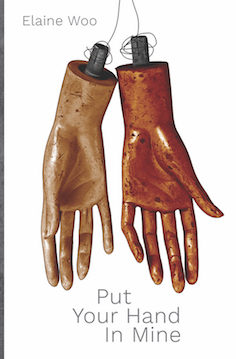
Put Your Hand in Mine
Elaine Woo
Signature Editions, 2019
Review by Kim Trainor
Vancouver poet Elaine Woo’s first collection, Cycling with the Dragon (Nightwood Editions, 2014), had an often whimsical tone, but despite the poems that focussed on joy and the solace offered by notebooks and creative acts, the persona of this first collection struggled to withstand an onslaught of other voices which sought to define her.
Put Your Hand in Mine (Signature Editions, 2019), Woo’s second collection, shares the same edgy, whimsy, delicate observation, and careful word choice. In the prose poem “The Myth of Barbie” Woo captures many of her preoccupations in Cycling: bittersweet memories of childhood combined with experiences of insecurity and structural racism. Barbie, the poem notes,
speaks egalitarian: my friends include Hispanic Teresa and African American
Christie. Or does she? All her friends bear dubious Caucasian features. Did the
product designers accentuate their own desire as the only flight path?
The poem observes that the unreal dimensions of Barbie meant she would have had “insufficient body fat to menstruate”, and asks “Does Barbie knit vulnerability? Or punish?” The speaker notes a 2005 study which “theorized that girls reject their Barbie dolls, punish them by decapitation or microwaving: a rite of passage and disavowal of their past ‘Barbie Syndrome.’” She concludes with her own satisfyingly sly decapitation, offering kudos to her mother: “you wouldn’t allow me one, spared me ritual beheading.”
In this second collection, more of the darker tone first heard in Cycling predominates, perhaps signaled by the divergent title and cover: the phrase Put Your Hand in Mine, which appears nowhere in the collection itself and yet suggests companionship paired with solitude, is illustrated by the image of two wooden mannequin hands on wire strings; the hands make contact at only one point. In response to my query regarding the cover image, Woo observed, “I see the mannequin hands as helpless, truncated hands, unable to affect much of consequence in the world. The poet copes with the small tools in her tool belt…My hands might as well be wooden.” While we see in many of these poems that damage has been done to the individual psyche, language seeks redress with these “small tools.” The poem is described as space for the introvert to acknowledge the opacity of others, to push back against incursions, to claim a voice that has been silenced, to seek peace.
In “Escape Route” the dark space between two human beings, which is impossible to cross, is described, scored by critique and insecurity:
Upon meeting, she and I split into distant oppositional points, water skeeters
bumping and separating, as she snarls: There is more to life than looking good.
Should I cloud my face, erase the genetically given, abstract my fingernails
into cerebral claws, dumb myself to match her unsaid take on my appearance?
Similarly, in “Alchemical Fire” there is an attempt by an interlocutor to confine the poet’s persona:
the way you ‘splained it
woman’s world is small
man’s world is large
my jaw gnaws offence to particles
…
ironed pleats of loneliness
swore I wouldn’t be Hoovered
in again but my flooding eyes
betray me oxygen intake plunges…
Here we see the wonderfully precise language used by Woo: the clenched jaws which attempt to grind down the offensive assertions to fine particles, the resistance to being “Hoovered / in again” by a dominant personality, the delicately phrased “pleats of loneliness.”
While writing provides solace, animals and glimmers of the natural world also offer a peaceful retreat from the rapacious energy suck of others. The brief poem “Great Company” provides respite to the reader, in which
We see in mountain meadows
the way standing zazen cows graze
the creatures simply are
their bells faint
tails brushing.
The cows make no demands upon us. “Zazen,” or ‘seated meditation,’ is practiced by “standing” cows; the contemplative tradition invoked by the reference to Zen presents the cows to us as a koan, analogous to a poem—it cannot be puzzled out in a rational manner, but is subject to intuition, image, sound. With the phrase, “zazen cows graze,” alliteration of /s/ and /z/ suggests the chewing of grass; we hear also the faint sound of bells and flicking tails. In experiencing this poem, we “simply are.”
Despite the insistence in many of these poems upon exploring the psychic and physical violence we inflict upon one another, even in casual everyday interactions, there is simultaneously a yearning to reach out to the other. We find a gloss on the collection’s title in the final lines of “Strand” where bystanders “gaze at the tender flesh of their palms / whisper what can one hand do?”
Kim Trainor is the author of Karyotype (Brick Books, 2015) and Ledi (Book*hug, 2018), which was short-listed for the Raymond Souster Award. She lives in Vancouver.